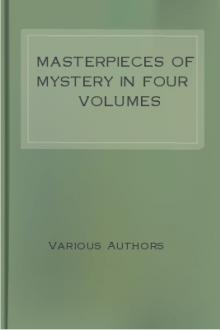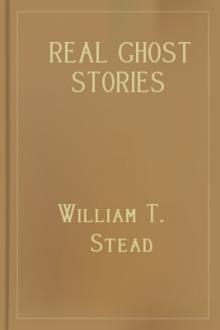Varney the Vampire; Or, the Feast of Blood by Prest and Rymer (ereader iphone .txt) 📗

- Author: Prest and Rymer
Book online «Varney the Vampire; Or, the Feast of Blood by Prest and Rymer (ereader iphone .txt) 📗». Author Prest and Rymer
"Then very good. Then, when the affair is all settled, I will trouble you for twenty pounds.
"You?"
"Yes, to be sure. Who else do you suppose is going to interfere with you? One is enough, ain't it, at a time; and I think, after giving you such advice as I have, that I am entitled, at all events, to something."
"I tell you what," said the landlord of the hotel, "taking all things into consideration, I have altered my mind rather, and won't do it."
"Very good. You need not; only mind, if you do, I am down upon you like a shot."
The excitement contingent upon the inquest was very great; indeed, the large room in the public-house, where it was held, was crowded to suffocation with persons who were anxious to be present at the proceedings. When the landlord reached home, of course he told his guest, the baron, of the discovery he had made, that the murdered man was the strange visitor of the previous night; for now, from the frightful wound he had received in his throat, the belief that he was murdered became too rational a one to admit of any doubts, and was that which was universally adopted in preference to any other suggestion upon the occasion; although, no doubt, people would be found who would not scruple to aver that he had cut his own throat, after making his way into the well belonging to Anderbury House.
The landlord had his own misgivings concerning his guest, the baron, now that something had occurred of such an awful and mysterious a nature to one who was evidently known to him. It did not seem to be a pleasant thing to have such an intimate friend of a man who had been murdered in one's house, especially when it came to be considered that he was the last person seen in his company, and that, consequently, he was peculiarly called upon to give an explanation of how, and under what circumstances, he had parted with him.
The baron was sitting smoking in the most unconcerned manner in the world, when the landlord came to bring him this intelligence, and, when he had heard him to an end, the remark he made was,—
"Really, you very much surprise me; but, perhaps, as you are better acquainted with the town than I am, you can tell me who he was?"
"Why, sir, that is what we hoped you would be able to tell us."
"How should I tell you? He introduced himself to me as a Mr. Mitchell, a surveyor, and he said that, hearing I talked of purchasing or renting Anderbury-on-the-Mount, he came to tell me that the principal side wall, that you could see from the beach, was off the perpendicular."
"Indeed, sir!"
"Yes; and as this was a very interesting circumstance to me, considering that I really did contemplate such a purchase or renting, and do so still, as it was a moonlight night, and he said he could show me in a minute what he meant if I would accompany him, I did so; but when we got there, and on the road, I heard quite enough of him to convince me that he was a little out of his senses, and, consequently, I paid no more attention to what he said, but walked home and left him on the beach."
"It's a most extraordinary circumstance, sir; there is no such person, I assure you, as Mitchell, a surveyor, in the town; so I can't make it out in the least."
"But, I tell you, I consider the man out of his senses, and perhaps that may account for the whole affair."
"Oh, yes, sir, that would, certainly; but still, it's a very odd thing, because we don't know of such a person at all, and it does seem so extraordinary that he should have made his appearance, all of a sudden, in this sort of way. I suppose, sir, that you will attend the inquest, now, that's to be held upon him?"
"Oh, yes; I have no objection whatever to that; indeed, I feel myself bound to do so, because I suppose mine is the latest evidence that can be at all produced concerning him."
"Unquestionably, sir; our coroner is a very clever man, and you will be glad to know him—very glad to know him, sir, and he will be glad to know you, so I am sure it will be a mutual gratification. It's at four o'clock the inquest is to be, and I dare say, sir, if you are there by half-past, it will be time enough."
"No doubt of that; but I will be punctual."
We have already said the room in which the inquest was to be held was crowded almost to suffocation, and not only was that the case, but the lower part of the house was crammed with people likewise; and there can be very little doubt but the baron would have shrunk from such an investigation from a number of curious eyes, if he could have done so; while the landlord of the house would have had no objection, as far as his profit was concerned in the sale of a great quantity of beer and spirits, to have had such an occurrence every day in the week, if possible.
The body lay still in the shell where it had been originally placed. After it had been viewed by the jury, and almost every one had remarked upon the extraordinary fresh appearance it wore, they proceeded at once to the inquiry, and the first witness who appeared was Mr. Leek, who deposed to have been in company with some gentlemen viewing Anderbury House, and to have found the body in one of the ice-wells of that establishment.
This evidence was corroborated by that of Davis, who had so unexpectedly jumped into the well, without being aware that it contained already so disagreeable a visitor as it did in the person of the murdered man, regarding the cause of whose death the present inquiry was instituted.
Then the landlord identified the body as that of a gentleman who had come to his house on horseback, and who had afterwards walked out with Baron Stolmuyer of Saltzburgh, who was one of his guests.
"Is that gentleman in attendance?" said the coroner.
"Yes, sir, he is; I told him about it, and he has kindly come forward to give all the evidence in his power concerning it."
There was a general expression of interest and curiosity when the baron stepped forward, attired in his magnificent coat, trimmed with fur, and tendered his evidence to the coroner, which, of course, was precisely the same as the statement he had made to the landlord of the house; for, as he had made up such a well connected story, he was not likely to prevaricate or to depart from it in the smallest particular.
He was listened to with breathless attention, and, when he had concluded, the coroner, with a preparatory hem! said to him,
"And you have reason to suppose, sir, that this person was out of his senses?"
"It seemed to me so; he talked wildly and incoherently, and in such a manner as to fully induce such a belief."
"You left him on the beach?"
"I did. I found when I got there that it was only a very small portion, indeed, of Anderbury House that was visible; and, although the moon shone brightly, I must confess I did not see, myself, any signs of deviation from the perpendicular; and, such being the case, I left the spot at once, because I could have no further motive in staying; and, moreover, it was not pleasant to be out at night with a man whom I thought was deranged. I regretted, after making this discovery, that I had come from home on such a fool's errand; but as, when one is going to invest a considerable sum of money in any enterprise, one is naturally anxious to know all about it, I went, little suspecting that the man was insane."
"Did you see him after that?"
"Certainly not, until to-day, when I recognised in the body that has been exhibited to me the same individual."
"Gentlemen," said the coroner to the jury, "it appears to me that this is a most mysterious affair; the deceased person has a wound in his throat, which, I have no doubt, you will hear from a medical witness has been the cause of death; and the most singular part of the affair is, how, if he inflicted it upon himself, he has managed to dispose of the weapon with which he did the deed."
"The last person seen in his company," said one of the jury, "was the baron, and I think he is bound to give some better explanation of the affair."
"I am yet to discover," said the baron, "that the last person who acknowledges to having been in the company of a man afterwards murdered, must, of necessity, be the murderer?"
"Yes; but how do





Comments (0)